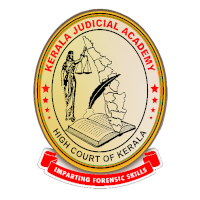AIMS AND OBJECTIVES
The broad curriculum goals for the induction course are:
● To prepare the trainees for performing their duties and functions when they assume office.
●To ensure uniformity and predictability of decisions by equipping them with adequate command of laws, procedures, and the technology of judging.
● To educate them on related areas of knowledge and skills useful for judicial work.
● To inculcate the right kind of values, attitudes, and perspectives desirable for undertaking judicial functions.
● To motivate and prepare for absorbing reformist initiatives, to overcome resistance to change and to manage the change in a manner beneficial to judicial administration.
● To strengthen the knowledge of the trainee officers in their basic subjective and procedural laws, the newly legislated laws, to sharpen their skills and develop their adjudication skills and the art of judgment writing.
● Ensure uniformity and consistency in judging by correct application of law to the diverse situation, adequate command of substantive and procedural law and the correct application of law.
● To develop the skill of Court craft, court management and time management, effective, efficient, and qualitative disposal of cases, with optimum use of information technology.
● To inculcate the sense of all kinds of values, attitudes, and broad outlook to the needs of the society and to use law as a vehicle for social change.
● Personality development to aid the proper, dignified, and general conduct of the judicial officer, right attitude to the lawyers, while dealing with the members of the society outside the court.
● To overcome the resistance to the better changes, to motivate and prepare for wider outlook of issues.
● For a proper and efficient management of the staff.
● Optimum use of Alternate Dispute Mechanism.
● To develop the skills of use of technology, e-filing, paperless court, and use of Information Technology for enhancing the qualitative disposal of the cases.
● To develop skill of interaction, removal of personal inhibition in public speech, to increase the confidence level by interacting in group discussion and to develop restrictive but gentle and courteous behaviour in court.
Members of the district judiciary must have proper attitude, skill, and knowledge for dispensation of justice. These three components are dealt with separately as they are of equal importance.
1) Attitude -
Inculcation of the right attitude has fundamental prominence in the justice delivery process. A judge would certainly be a better dispenser of justice if he is aware of the currents and passions of the time, the developments of technology and the sweep of events. A judge must live, think, and partake of opinions in the real world for judging. Interaction with other social scientists, experts in the new technology et cetera are essential for a judicial officer. Imbibing true judicial ethics has seminal importance. A judicial officer must have the right perspective and principled mooring. Courses on stress management, health management etc. would improve the working environment. Training must reflect on the fundamental values of the court system, including fairness, access to justice, and the rule of law keeping pace with the intricate ethical and social issues raised by advances in science and technology.
2) Skill -
Judicial institutions are increasingly becoming a “career” in which new appointments are being made from among younger, less experienced persons, non-lawyers, those with less traditional legal backgrounds, who have both a need for and hope of continuing professional development. They have lesser understanding of courtroom practises unlike lawyers and therefore managing packed court rooms would be an arduous task for them.
In an adversarial setting, in a courtroom, lawyers representing opposing parties try to persuade the judicial officers. If it fails, they try to dissuade him/her and at times even attempt to prevent him/her from deciding cases. Skill required to manage such a setting is vastly different from managing an ordinary office where there are people who are primarily expected to work at the beckoning of the manager and in which management specialists generally excel. Those who are placed in charge of a court may need to learn management skills appropriate to their task and herein lies the importance as to who should train a new entrant and how.
3) Knowledge: Dispensation of justice requires deep knowledge in law, both substantive and procedural. Every judgement reflects the acumen in law of the judge who writes it. Knowledge of precedents in the topic has a vital role in making the judgement legally correct and judicially sound. It is also important that the judicial officers are kept abreast with the development of law in the areas relevant to them. Academy has devised a participative mode of training for imparting knowledge, where doubts raised by officers will be discussed thoroughly and relevant inputs will be given to the officers.
